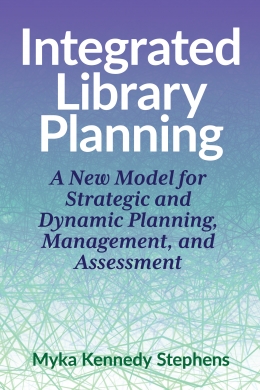
Primary tabs
You don't need to be an ALA Member to purchase from the ALA Store, but you'll be asked to create an online account/profile during the checkout to proceed. This Web Account is for both Members and non-Members. Note that your ALA Member discount will be applied at the final step of the checkout process.
If you are Tax-Exempt, please verify that your account is currently set up as exempt before placing your order, as our new fulfillment center will need current documentation. Learn how to verify here.
- Description
- Table of Contents
- About the author
Many library project plans, from small projects to institution-wide strategic planning committees, follow a linear trajectory: create the plan, do the plan, then review the outcome. While this can be effective, it also sometimes leads to disregarding new information that emerges while executing the plan, making the outcome less effective. Planning processes can also feel forced and predetermined if stakeholder feedback is not seriously considered. When this happens too many times, people stop offering their honest opinions and new ideas because they have learned that the planners do not really want to hear them.
In a concise seven chapters offering illustrations, charts, sample outlines, and many tools and resources, Integrated Library Planning offers a different kind of approach to planning that is both strategic and dynamic. It is fueled by open communication, honest assessment, and astute observation. Voices at the table, near the table, and far from the table are heard and considered. Its perpetual rhythm gives space to consider new information when it emerges and freedom to make changes at a time that makes sense instead of when it is most convenient or expected.
The era of fixed-length strategic plans is coming to an end. Five-year strategic plans had already given way to three-year strategic plans, and now we find ourselves needing to plan and function when nothing is certain beyond the present moment. The components of this model might look deceptively similar to the strategic planning practices used in libraries and organizations for decades; however, when implemented as a whole, with a monthly review cycle on a rolling planning horizon and space for regular analysis of information needs and behavior, it has the potential to shatter any previous notions of planning that serve only to satisfy administrators. Integrated Library Planning can help libraries effectively navigate and become agents of change.
Introduction
Chapter 1. Infinite Horizons
Chapter 2. Pivoting Toward an Integrated Future
Chapter 3. Foundation and Groundwork
Chapter 4. Building a Planning Structure
Chapter 5. Implementing a Monthly Review Cycle
Chapter 6. Long-Term Assessment and Adjustment
Chapter 7. Stepping into an Integrated Future
Acknowledgments
- Appendix A. Helpful Resources and Tools
- Appendix B. Sample Report Outlines
Bibliography
About the Author
Myka Kennedy Stephens
Myka Kennedy Stephens is Seminary Librarian and Associate Professor of Theological Bibliography at Lancaster Theological Seminary in Lancaster, Pennsylvania. She provides oversight for theological library collections and services for Lancaster Theological Seminary and Moravian Theological Seminary, located in Bethlehem, Pennsylvania. Myka is also Founder and CEO of Fosgail, providing executive coaching and consulting services to professionals in libraries and related fields. She is fascinated by theories of human information behavior and their practical applications for library leadership and administration. She is also a strong advocate for open-source software for libraries and writes and presents widely on these topics. Myka holds degrees from Southern Methodist University (BA), Emory University (MDiv), and Florida State University (MSLIS), and she is a deaconess of The United Methodist Church appointed to service in librarianship.


